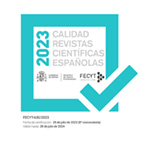Decir verdadero y ontología en Platón. Un análisis desde Foucault
Resumen
Foucault’s analysis of “parrhesy” ends his project of a “history of the truth”. The parrhesy shows the being of the subject as only activity and, thus, it points out the essential limit between the subject’s being as éthos and the subject’s being as téchne. That is, it points out the border, which we can find first in Plato, between philosophy and rethoric (non-philosophy). The purpose of this paper is to show that (1) philosophy is un-thematized as opposed to the dependence of the theme of rhetoric.( 2) Philosohy is duty, the acknowledgment of the factical finitude of man (soul), and criticism, the discovery of the need of truth-telling in the game of the soul and the pólis.(3) Philosophy is the exposition to the danger that means the decadence of the pólis, as opposed to the assurance of the more advantageous position in it.Descargas
Descarga artículo
Licencia
La revista Logos. Anales del Seminario de Metafísica, para fomentar el intercambio global del conocimiento, facilita el acceso sin restricciones a sus contenidos desde el momento de su publicación en la presente edición electrónica, y por eso es una revista de acceso abierto. Los originales publicados en esta revista son propiedad de la Universidad Complutense de Madrid y es obligatorio citar su procedencia en cualquier reproducción total o parcial. Todos los contenidos se distribuyen bajo una licencia de uso y distribución Creative Commons Reconocimiento 4.0 (CC BY 4.0). Esta circunstancia ha de hacerse constar expresamente de esta forma cuando sea necesario. Puede consultar la versión informativa y el texto legal de la licencia.











